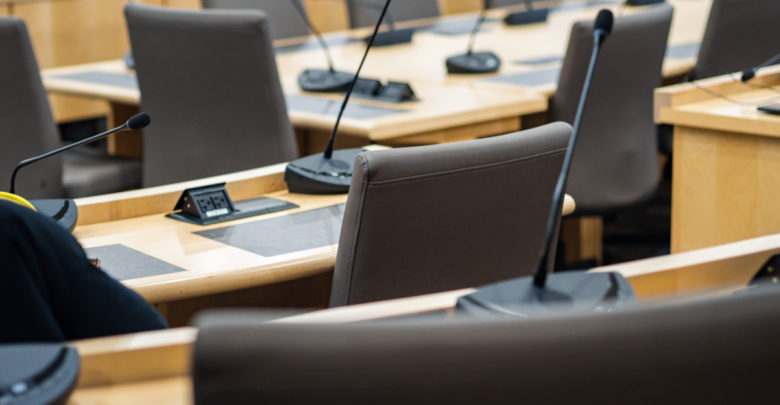Notes From Council: ISA presents finalized ISAF proposal
According to Gurbani Baweja, vice-president (external) of the International Students’ Association, there are six primary allocations that will fall under the ISAF.
 Helen Zhang
Helen Zhang“Notes from Council” is The Gateway’s ongoing series of recaps of noteworthy items from Students’ Council meetings.
Gurbani Baweja, vice-president (external) of the International Students’ Association (ISA), presented a finalized proposal on their International Students’ Association Fee (ISAF) to the Students’ Council on August 24 alongside Dhir Bid, vice-president (finance) of ISA.
ISAF proposal contains six financial allocations
Baweja began the presentation by breaking down the different allocations of the ISAF. These components were formulated after consultation with the Students’ Council and the U of A student body. According to Baweja, there are six primary allocations that will fall under the ISAF:
- Services, events, and programs
- Support, awards, and funding
- Community, diversity, and culture
- An ISA that stands by international students
- Health, wellness, and professional development
- Communications, outreach, and advocacy
In the financial breakdown provided by the ISA executives, services, events, and programs would be allocated approximately 30 per cent of the money collected by the ISAF. 20 per cent would go towards support, awards, and funding, 15 per cent towards community, diversity, and culture, 15 per cent towards ensuring the ISA stands by international students, 10 per cent towards health, wellness, and professional development, and 10 per cent towards communications, outreach, and advocacy.
Baweja described the money allotted towards services, events, and programs as “aimed towards enriching international students’ experience on campus by offering different services, events, and programs while building strong relationships with other students.”
The funds put towards services, events, and programs would cover the International Students’ Benefit Card (ICard), which would work towards providing international students with discounts around the Edmonton area.
The ISA also mentioned various year-round events that would be covered in this category, such as an Annual Christmas Carnival, International Students Week, Explorations Week, and International Students’ Sports Week.
According to Bajewa, the 20 per cent allocated towards supports, awards, and funding are to “alleviate financial barriers [faced] by international students, [thereby] helping them accomplish their goals by recognizing outstanding student achievement through various awards.”
This would include awards such as a Community Engagement Recognition Award Program and supports for “students who do not qualify for UAI [UAlberta International] or the RO [Registrar’s Office] funding but still have a visible need for emergency support.”
Baweja described the money allotted towards community, diversity, and culture as resulting in “better engagement for international students with the diverse communities at the U of A.” According to the ISA, a portion of the funds is planned to go towards a community support fund, which would provide funding BIPOC groups promoting diversity and community.
According to Bajewa, funds allocated towards “an ISA that works for you” are in place to develop “a stronger ISA [that] is essential to safeguard international students’ interests and more strongly advocate for them.” Under the current plan, expenses funds this allocation would include funding for an International Students’ Hub, election expenses, operational, administrative, office, and logistical expenses, and a Volunteer Appreciation Program. This was the only allocation with a significant adjustment from previous presentations, with the removal of board honorariums.
“There is a change under this allocation — we have removed board honorariums,” Bajewa explained. “After we sent out a mass email to our student membership explaining the changes that have been made to the ISAF, a lot of them reached back to us stating that they wouldn’t be really comfortable having a board honorarium under this fee, so we have planned to take it down.”
Utilizing the money allotted to health, wellness, and professional development, the ISA discussed plans to hold events to counter student loneliness and support student mental health, organize outdoor activity trips and exploration, host alumni networking nights, and provide students with career-orientated workshops.
“The health, wellness, and professional development [allocation] aims [to] enhance individual mental, physical and professional growth while building a strong community and lifelong connections,” Bajewa explained.
When considering the 10 per cent allotted towards communications, outreach, and advocacy, Baweja described prioritizing “the voices of international students at the U of A while providing customized resources that address their unique needs and concerns.” These funds are planned to go towards informative sessions on financial literacy for international students, along with the ISA’s communication tools, including their website.
ISAF amended to three-year length
The ISA received criticism at previous Students’ Council meetings on the ISAF’s length. After the ISAF was initially proposed to last five years before students had another chance to vote on the fee, many representatives on the Students’ Council recommended shortening the term to three years. Taking this into consideration, the ISA shortened the length to four years at a previous council meeting.
Now, at August 24’s Students’ Council meeting, Bhid revealed the ISA’s new plan to run the ISAF for three years.
“We have done a lot of consultation on how long we want to run the fee — we’re finally at three years,” he said. “After three years, students will be able to vote again.”




